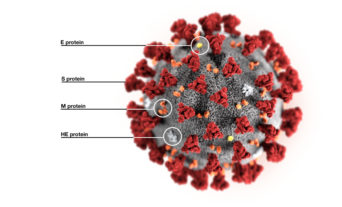There have been key changes in the death certification/registration process following the introduction of emergency legislation in the Coronavirus Act (2020).1 This article aims to highlight some of the lessons learned with respect to the Medical Certificate of Cause of Death (MCCD) completion for hospital deaths during this turbulent period (with legal references applicable to England and Wales).
Accurate and timely completion of a MCCD is important in enabling the bereaved to promptly register a death and informing national statistics. During the pandemic, the Office for National Statistics has published weekly mortality reports on the number of MCCD that mention COVID-19. Furthermore, all COVID-19-related hospital deaths (regardless of swab result) need to be formally reported as soon as possible to NHS England (NHSE) via the COVID-19 Patient Notification System (CPNS).2 This timely sharing of mortality data helps to track the pandemic with the potential to guide public health policies.3
Legislative changes
One of the main changes brought about by the emergency legislation relates to who can sign a MCCD, with any medical practitioner (with a GMC registration) being able to do so providing the following criteria are met:
- it is not practicable for the attending doctor to complete the MCCD
- you are able to give a cause of death to the best of your knowledge and belief
- a medical practitioner has seen the deceased either during their final illness (extended from 14 days to 28 days) or seen the body after death (e.g at verification).1
It is therefore possible for doctors such as medical examiners (MEs) in exceptional circumstances, to complete MCCDs without having attended the deceased during their final illness or after death as long as notification to the coroner is not indicated (the usual obligatory reasons still apply4).
Cause of death
In hospital, the completion of MCCD is usually straightforward. However, controversies have arisen as to the level of diagnostic proof required to give COVID-19 as a cause of death as opposed to simply ‘pneumonia’. Since false-negative swab results are not uncommon, if the clinical suspicion of COVID-19 is high (for example with typical symptoms, radiology, lymphopenia and clinical picture) then COVID-19 should be given in part 1 if this is felt clinically to be the most probable direct cause of death even if the swab is negative. Conversely, if a person dies from another direct natural cause but has a positive COVID-19 swab result, then strong consideration should be given as to whether COVID-19 was a significant contributing factor (and enter this in part 2 as appropriate). It is also important to enter co-morbidities that have significantly contributed to death (e.g obesity, hypertension, ischaemic heart disease, diabetes, chronic renal failure and/or dementia in part 2).
While COVID-19 is an acceptable natural cause of death, there have been increasing concerns regarding COVID-19 deaths in healthcare and other workers where it could be argued that COVID-19 was contracted at work.5 In law, any disease proposed on MCCD that may be ‘related to the deceased’s employment’ necessitates notification to the coroner.4 If there is reason to suspect that human failure contributed to the person being infected at work (for example due to a lack of personal protective equipment), then this makes the death potentially ‘unnatural’ and the coroner should be informed. Even though the Senior Coroner has issued guidance to coroners that an inquest may not be the best format for the investigation of such deaths, this does not remove a doctor’s obligation to notify the coroner.6
Death certification units and the ME system
In setting up a COVID-19 pandemic death certification unit, the primary aim was meeting the legal requirement to register deaths within five days3 and to enable the dignified storage and release of bodies from the mortuary (preventing ghastly images we’ve seen in other countries). Fortunately, we were not overwhelmed by the feared peak volume of deaths and even at an emergency field hospital it was possible to incorporate some of the beneficial aspects of the ME system; namely, providing channels of communication for families to raise concerns after death and providing independent scrutiny of all deaths (ensuring appropriate notifications to the coroner and feeding into the hospital clinical governance framework). An important lesson was the value of skilled bereavement support officers not only in providing administrative knowledge and support, but especially in guiding the bereaved through the registration process, which was even more challenging given social distancing rules. Furthermore, communication, teamwork and patience with the local registrar and crematorium were vital given some of the nuances of the new legislation.
An important lesson was the value of skilled bereavement support officers not only in providing administrative knowledge and support, but especially in guiding the bereaved through the registration process, which was even more challenging given social distancing rules.
Established London Hospitals have taken different approaches regarding the ME system during the pandemic, with some suspending its introduction to concentrate on core (legal) requirements and others embracing it. I have observed many advantages of the system during the pandemic. For example, MEs have been supporting junior doctors by encouraging them to take a break from the wards to talk through a death (with a refreshment) for collaborative scrutiny, providing advice on legal changes, assisting the timely completion of paperwork, and essentially taking over MCCD (and Cremation form 4 completion7) at the peak of the pandemic.
Contact with bereaved families
One of the most rewarding but sometimes harrowing aspects has been explaining to relatives what has been written on an MCCD and addressing any concerns they may have. It is here that the tragedy of a death hits home, with not infrequent stories of multiple deaths within families due to COVID-19, or other family members on ventilators. By taking time to address what are often relatively straightforward questions in relation to the MCCD (e.g ‘was it really COVID that killed him/her doctor?’, ‘but what about that swab test?’) and broader questions in relation to the death (e.g ‘was he/she comfortable?’), you may aid the first steps in the bereavement process. The questions are often unpredictable and sometimes surprising, however having scrutinised the death and with access to the clinical records, it is usually possible to satisfactorily address any lingering queries. Other issues may be less easy to address but may require prompt action, e.g unmet safeguarding concerns regarding a dependent relative or the breathless relative on the phone (emotional upset versus COVID-19 desaturation).
Many families have expressed their huge appreciation of the care given and this is something I’ve had the pleasure of feeding back to clinical teams.
Many families have expressed their huge appreciation of the care given and this is something I’ve had the pleasure of feeding back to clinical teams. However, it is not unsurprising that in establishing what are effectively new ways of working in hospitals, involving staff deployed to unfamiliar roles, dealing with a new disease with pandemic-level staff to patient ratios, using different specialist equipment, and with added challenges such as personal protective equipment, concerns regarding quality of care have occasionally arisen. The use of independent doctors to scrutinise death for purposes of accurate MCCD completion and to ensure actions are taken in the appropriate manner to address concerns from staff or families will help maintain trust, drive improvements and aid tracking of the pandemic.
Acknowledgements: I would like to thank Dr John du Parcq and Dr Nigel Kennea for their advice.



